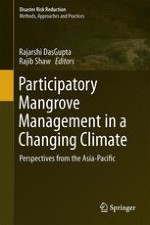2017 | OriginalPaper | Buchkapitel
6. Actor-Centered Interest Power Analysis of Participatory Biodiversity Conservation Policy Program in and Around the Bangladeshi Sundarbans
verfasst von : Md. Nazmus Sadath, Carsten Schusser, Md. Enamul Kabir
Erschienen in: Participatory Mangrove Management in a Changing Climate
Verlag: Springer Japan
Aktivieren Sie unsere intelligente Suche, um passende Fachinhalte oder Patente zu finden.
Wählen Sie Textabschnitte aus um mit Künstlicher Intelligenz passenden Patente zu finden. powered by
Markieren Sie Textabschnitte, um KI-gestützt weitere passende Inhalte zu finden. powered by
